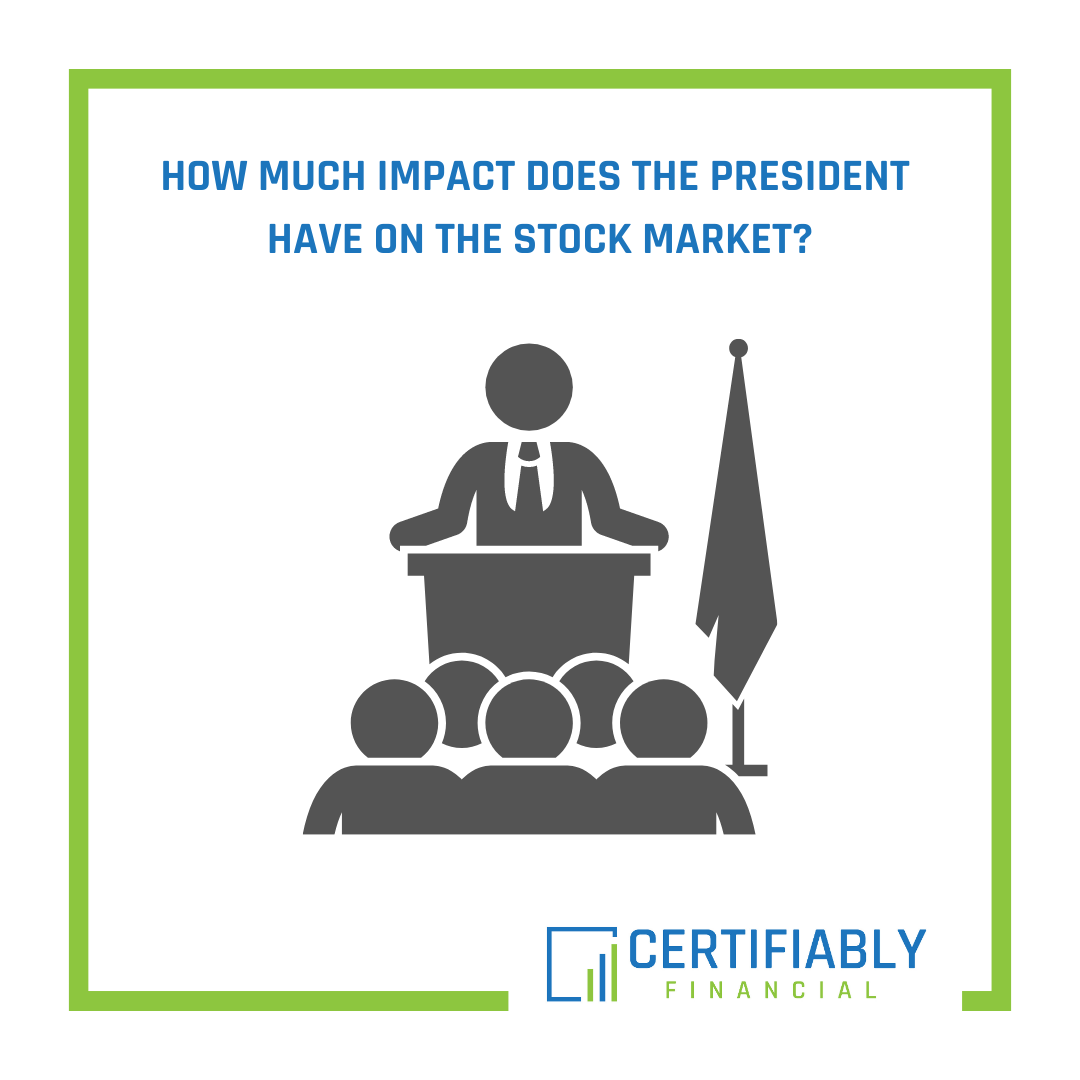I don’t need to tell you how contentious this election season has been. Personally, I can’t wait to stop seeing all of the political ads and I’d rather have a different topic to have to make small talk about. People on both sides of the political spectrum often become worried about how the result of the election will impact their investment portfolio. No matter what side you’re on, if the other side wins, then you think it’s going to be doomsday for your retirement dreams. So, how much impact does the President have on the stock market? A lot less than most people think.
The Stock Market Goes Up Under Both Republican & Democratic Presidents
The market might react one way or the other in the short-term, but successful investing is focused on the long-term. Making decisions based on short-term market moves often leads to poor outcomes.
Don’t let politics derail your portfolio. In other words, don’t develop an investment policy based on politics. Who the President is or what party controls Congress has never been an input in creating a successful long-term portfolio strategy. If you only want to be invested when one party is in control and history repeats itself, then you’re going to miss out on stock market gains no matter who the President is.
Check out this interactive chart from Dimensional Fund Advisors showing market and economic data by presidency going back to 1929: How Much Impact Does the President Have on Stocks?. (You can click on each president to see economic data during their time in office such as which parties controlled the Senate and House, unemployment, inflation, deficit/surplus as % of GDP, average GDP growth, and growth of wealth).
Below is a snapshot of the chart which shows that the S&P 500 has continued to increase over time under both blue and red regimes. Sure, you can see dips in the stock market during every presidency, but the general theme over the long run has been that the market has gone up.
Here’s a video that goes along with the chart to help explain its underlying meaning a little further.
Should I Adjust My Portfolio Before The Election?
Here’s a resource page from JPMorgan Asset Management: US Presidential Election 2020: Our Latest Insights.
Here are a few of my key takeaways from this site:
Don’t let how you feel about politics overrule how you think about investing.
Political opinions are best expressed on Election Day, not in a portfolio. As discussed in “How should investors approach investing in an election year?” we highlight data that shows political opinions can skew how people feel about the economy. Yet, during both the Obama and Trump administrations, we have seen above-average market returns.
Market volatility may be heightened, but transitory.
Time in the market should dampen the impacts of election volatility over time.
Should I adjust my portfolio before the election? No.
The truth is that the market goes up over time no matter whether the President is a Republican or Democrat. The stock market cares about certainty more than it cares about party affiliation.
They key takeaways? Manage your emotions and maintain a long-term investment approach.
The Federal Reserve & Treasury Impact The Market & Economy More Than The President
I’d argue that the Fed has a lot more to do with the success of the stock market and the economy than the President does. The President can come into office at any point in time during the economic cycle. A president who inherits an economy that’s trending towards recession may also inherit a market that results in worse returns than a president who comes into an economy that’s expanding.
The Federal Reserve controls monetary policy and is supposed to work independently of the Executive Branch while the Treasury collects taxes, offers economic advice to the President, and prints money. The two work together to keep the economy (and at times the stock market) stable.
We’ve seen the efforts of their joint impact on the market in a huge way in 2020. Remember when the S&P was down over 30% earlier this year? Well, as of October 23, it was up nearly 9% largely due to the actions of the Fed and the Treasury throughout the year.
Reacting Can Hurt Performance
Finally, I urge you to consider this slide below which illustrates the performance of the S&P 500 from 1990-2019. If you remained invested over this time period and didn’t react, then you would have been rewarded with a 9.96% annualized compound return. Missing just the 15 best days in the market over a 29-year time period would have cut your return down by nearly 3.5%. How you react matters.
And there were plenty of reasons to get nervous and not remain invested during that time. Just look at the next slide.
So what’s the point? Focus on what you can control and stay disciplined in your investment approach.
The stock market may be volatile in the short-term and it could go down, but if history repeats itself, then staying invested will reward you in the long run. An election comes every 4 years, but your investing horizon (and retirement) is going to last a lot longer than that.

